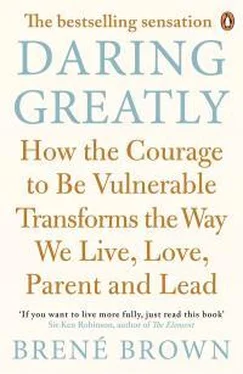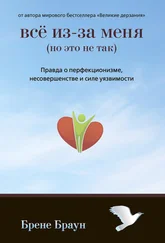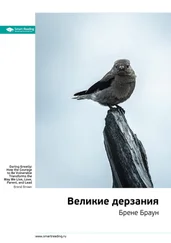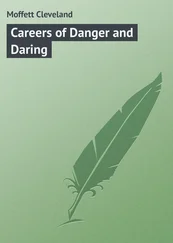Shame is so painful for children because it is inextricably linked to the fear of being unlovable. For young children who are still dependent on their parents for survival—for food, shelter, and safety—feeling unlovable is a threat to survival. It’s trauma. I’m convinced that the reason most of us revert back to feeling childlike and small when we’re in shame is because our brain stores our early shame experiences as trauma, and when it’s triggered we return to that place. We don’t have the neurobiological research yet to confirm this, but I’ve coded hundreds of interviews that follow this same pattern:
“I don’t know what happened. My boss called me an idiot in front of my team and I couldn’t respond. All of a sudden I’m back in Mrs. Porter’s second-grade class and I’m speechless. I can’t come back with one decent response.”
Or
“My son struck out for the second time and I couldn’t see straight. I always said I’d never do what my dad did to me, but there I was screaming at him in front of his teammates. I’m not even sure how it happened.”
In Chapter 3 we learned that the brain processes social rejection or shame the same exact way it processes physical pain. I suspect we’ll eventually have the data to support my hypothesis about children storing shame as trauma, but in the meantime I can say without hesitation that childhood experiences of shame change who we are, how we think about ourselves, and our sense of self-worth.
We can work hard not to use shame as a parenting tool, but our children are still going to encounter shame in the outside world. The good news is that when children understand the distinction between shame and guilt, and when they know that we’re interested and open to talking about these feelings and experiences, they are much more likely to talk to us about the shaming experiences they may encounter with teachers, coaches, clergy, babysitters, grandparents, and other adults who have influence in their lives. This is critically important because it gives us the opportunity to “crop” shame the way we do photographs.
I often use a scrapbook as a metaphor to talk about the impact shame has on children. As parents, once we learn about shame, we will more than likely realize that, yes, we’ve shamed our children. It happens. Even to shame researchers. Given the severity of the outcomes around shame, we’ll also begin to worry that the shaming moments that happen outside our home will define our children, despite our best efforts in the family. And those experiences will happen—name calling, put-downs, and teasing are rampant in our culture of cruelty. The good news, however, is that we have a lot of influence over how much power those experiences have in our children’s lives.
Most of us can remember shaming events from childhood that felt defining. But more than likely we remember them because we didn’t process those experiences with parents who were open to talking about shame and committed to helping us cultivate shame resilience. I don’t blame my parents for that any more than I judge my grandmother letting me stand next to her in the front seat while she was driving. They didn’t have access to the information we have today.
Knowing what I do now, I think about shame and worthiness in this way: “It’s the album, not the picture.” If you imagine opening up a photo album, and many of the pages are full of eight-by-ten photos of shaming events, you’ll close that album and walk away thinking, Shame defines that story. If, on the other hand, you open that album and see a few small photos of shame experiences, but each one is surrounded by pictures of worthiness, hope, struggle, resilience, courage, failure, success, and vulnerability, the shame experiences are only a part of a larger story. They don’t define the album.
Again, we can’t shameproof our children. Our task instead is teaching and modeling shame resilience, and that starts with conversations about what shame is and how it shows up in our lives. The adults I interviewed who were raised by parents who used shame as a primary parenting tool had much more difficulty believing in their worthiness than the participants who experienced shame occasionally and were able to talk about it with their parents.
If you have grown children and are wondering if it’s too late to teach shame resilience or to change the album, the answer is no. It’s not too late. The power of owning our stories, even the difficult ones, is that we get to write the ending. Several years ago, I received a letter from a woman who wrote:
Your work changed my life in a very strange way. My mom saw you speak at a church in Amarillo. Afterwards, she wrote me a long letter that said, “I had no idea there was a difference between shame and guilt. I think I shamed you your entire life. I meant to use guilt. I never thought you weren’t good enough. I did not like your choices. But I shamed you. I can’t take that back, but I need you to know that you’re the best thing that ever happened to me and I’m so proud to be your mother.” I couldn’t believe it. My mom is seventy-five and I’m fifty-five. It healed so much. And it changed everything, including the way I parent my own kids.
In addition to helping our children understand shame, and use guilt self-talk rather than shame self-talk, we have to be very careful about shame leakage. Even if we don’t shame our children, shame still shows up in our lives in ways that can have a powerful affect on our family. Basically, we can’t raise children who are more shame resilient than we are. I can encourage Ellen to love her body, but what really matters are the observations she makes about my relationship with my own body. Damn it. I can soothe Charlie’s concerns that he might run the wrong direction around the bases by telling him that he doesn’t have to fully understand the ins and outs of baseball before his first T-ball game, but does he observe me and Steve trying new things, making mistakes, and failing without becoming self-critical? Damn it. Again.
Lastly, normalizing is one of the most powerful shame-resilience tools that we can offer our children. Like I explained in the last chapter, normalizing means helping our children know they’re not alone and that we’ve experienced many of the same struggles. This applies to social situations, changes in their bodies, shaming experiences, feeling left out, and wanting to be brave but feeling afraid. There’s something sacred that happens between a parent and a child when the parent says, “Me too!” or shares a personal story that relates to their child’s struggle.
MINDING THE GAP: SUPPORTING OUR CHILDREN MEANS SUPPORTING EACH OTHER
I believe it’s important at this point to pause to recognize the shaming nature of parenting “values” debates. When you listen to conversations, or read books and blogs, about controversial and/or divisive issues in parenting, like how and where women labor, circumcision, vaccinations, co-sleeping, feeding, etc., what you hear is shame and what you see is hurt. Deep hurt. You see people—mostly mothers—engaging in the exact same behaviors that I earlier defined as shaming: name calling, put-downs, and bullying.
Here’s what I’ve come to believe about these behaviors: You can’t claim to care about the welfare of children if you’re shaming other parents for the choices they’re making.Those are mutually exclusive behaviors and they create a huge values gap. Yes, most of us (myself included) have strong opinions on every one of those topics, but if we really care about the broader welfare of children, our job is to make choices that are aligned with our values and support other parents who are doing the same. Our job is also to tend to our own worthiness. When we feel good about the choices we’re making and when we’re engaging with the world from a place of worthiness rather than scarcity, we feel no need to judge and attack.
Читать дальше






![Брене Браун - Вопреки. Как оставаться собой, когда всё против тебя [litres]](/books/436389/brene-braun-vopreki-kak-ostavatsya-soboj-kogda-v-thumb.webp)





